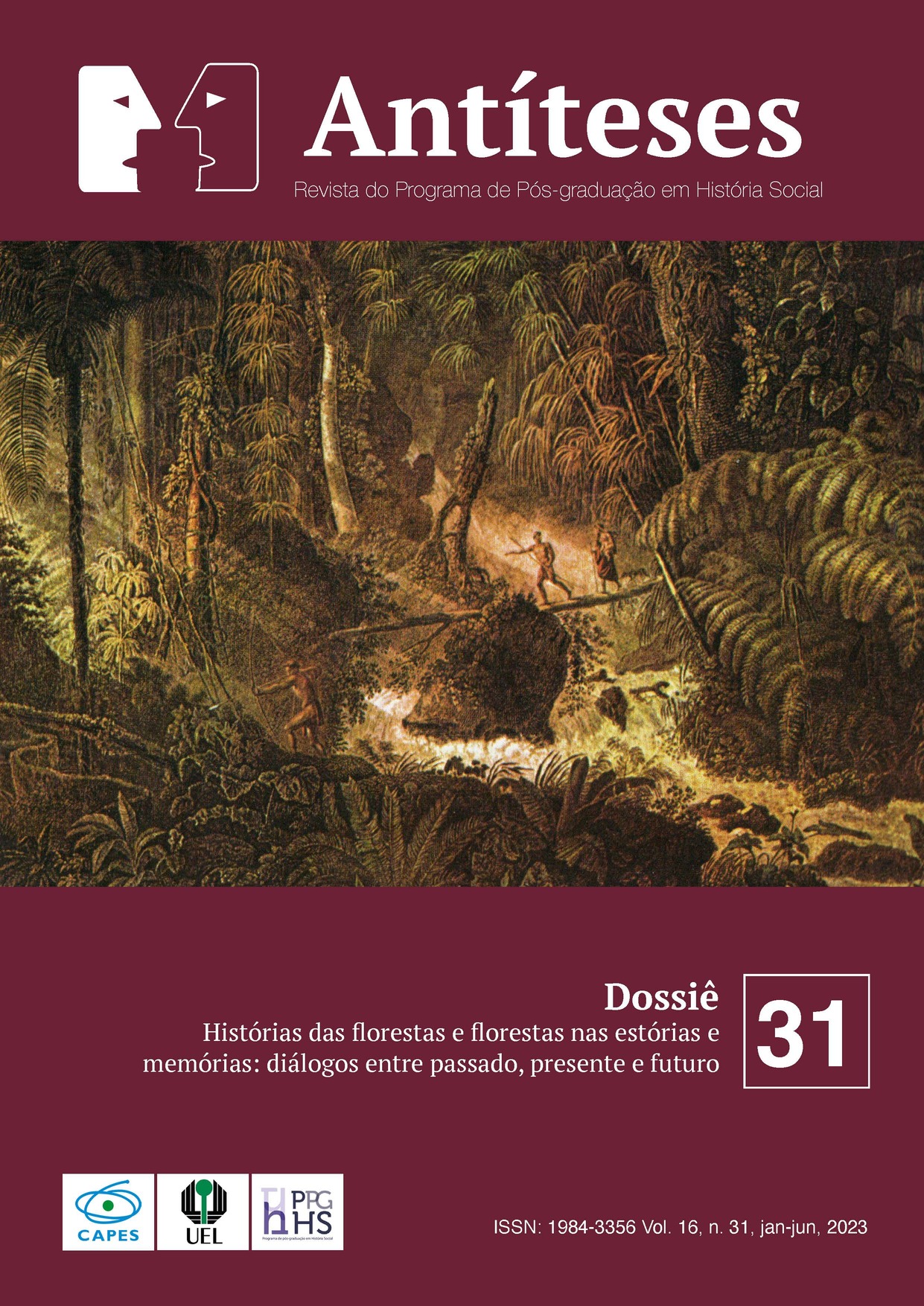Forests as subject and terricídio
an epistemological semiology from the amerindian thought
DOI:
https://doi.org/10.5433/1984-3356.2023v16n31p025-058Keywords:
Forests, Epistemology, Semiotics, Terricídio, EthnographyAbstract
The main argument consists in the acceptance of a non-anthropocentric Amerindian cosmological imperative that forest can be understood by the Human Sciences as an active historical subject, producer of knowledge, meanings and communications, even if it is not symbolic or humanly linguistic. For this purpose, we are going to realize a theoretical and anthropological discussion of ethnographic writings in the sense of supporting the possibility of understanding as epistemologically valid the existence of a semiotic, which grounds the recognition and intercommunication between animals-humans, animals non-humans and other kingdoms in forest cohabitation, understanding forest itself as a subjectively constituted and self-determined entity. To achieve that understanding we are going to divide our writing into two parts. First, we are going to study the anthropology of Eduardo Kohn about a semiotics of forests, which confers them an active subject status, as producers of knowledge and languages. In the second part of our paper, we are going to address the concept of terricídio, as thought by the leaders of the Movimiento de Mujeres Indígenas por el Buen Vivir nation in the claim for legal recognition of the murder of forests as a heinous crime. Such process is established precisely by recognizing the sacred, individual, communicational, cognitive and thinking character of forests and their complex interrelational network of coexisting inhabitants.
Downloads
References
ACOSTA, Alberto. O bem viver: uma oportunidade para imaginar outros mundos. São Paulo: Autonomia Literária, 2016.
ÁLVAREZ ÁVILA, Carolina. Movimiento de mujeres indígenas por el Buen Vivir: marchando entre la política, lo político y lo ontológicamente diverso en Argentina. Nuevo Mundo Mundos Nuevos, [Buenos Aires], 2019. Disponível em: http://journals.openedition.org/nuevomundo/76814. Acesso em: 14 maio 2023.
BALCARCE, Gabriela. Políticas del buen vivir: Miradas sobre el terricidio y espiritualidades no modernas. ABATIRÁ - Revista de Ciências Humanas e Linguagens, Eunápolis, v. 2, n. 4, p. 446- 458, 2021. Disponível em: https://www. revistas.uneb.br/index.php/abatira/article/view/13087/9149. Acesso em: 3 fev. 2023.
BENGOA, Jose. Los mapuches: historia, cultura y conflicto. Cahiers des Amériques Latines, Paris, n. 68, p. 89-107, 2012. Disponível em: https://journals.openedition. org/cal/118. Acesso em: 14 maio 2023.
BLOCH, Marc. Apologia da história ou o ofício de historiador. Rio de Janeiro: Jorge Zahar Editora, 2001.
BONET I MARTÍ, Jordi. El movimiento mapuche en Chile: de la reivindicación por la tierra alreconocimiento como pueblo. In: FUNDACIÓN BETIKO. Anuario de movimientos sociales. Santiago: Fundación Bertiko, 2013. Disponível em: https://fundacionbetiko.org/wp-content/uploads/2014/03/El-movimiento-mapuche-en-Chile.pdf. Acesso em: 3 fev. 2023.
CHAKRABARTY, Dipesh. O clima da história: quatro teses. Sopro 91, Florianópolis, p. 1-21, jul. 2013. Disponível em: http://www.culturaebarbarie.org/sopro/n91s.pdf . Acesso em : 3 fev. 2023.
COMUNIDAD DE HISTORIA MAPUCHE. Ta iñ fijke xipa rakizuameluwün: Historia, colonialismo y resistencia desde el país Mapuche. Temuco: Ediciones Comunidad de Historia Mapuche, 2012.
DANOWSKI, Déborah; VIVEIROS DE CASTRO, Eduardo. Há um mundo por vir? Ensaio sobre os medos e os fins. Florianópolis: Cultura e Barbárie, 2017.
FOSTER, John Bellamy. A ecologia de Marx: materialismo e natureza. Rio de Janeiro: Civilização Brasileira, 2005.
GOMÉZ, Mariana. Desde los márgenes de la (pluri)nación: movimiento de mujeres indígenas por el Buen Vivir en Zona Franca. Revista Zona Franca, Rosário, n. 28, p. 136-174, 2020. Disponível em: https://ri.conicet.gov.ar/ bitstream/handle/11336/132191/CONICET_Digital_Nro.c897511d-60a3-44c8- bb59-4999fe74acec_A.pdf?sequence=2&isAllowed=y. Acesso em: 14 maio 2023.
HAESBAERT, Rogério. A corporificação "natural" do território: do terricídio à multiterritorialidade da Terra. GEOgraphia, Niterói, v. 23, n. 50, p. 1-19, 2021. Disponível em: https://periodicos.uff.br/geographia/article/view/48960. Acesso em : 3 fev. 2023.
HERINGER JÚNIOR, Bruno; SPAREMBERGER, Raquel Fabiana Lopes. O nexo ecocídio-genocídio: a destruição do ambiente natural como causa e como método de eliminação de grupos humanos. Revista Jurídica Luso-brasileira, Lisboa, ano 3, n. 6, p. 1111-1141, 2017. Disponível em: https://www.cidp.pt/revistas/ rjlb/2017/6/2017_06_1111_1141.pdf. Acesso em: 3 fev. 2023.
INGOLD, Tim. Antropologia: pra que serve? Petrópolis: Vozes, 2019.
KOHN, Eduardo. Cómo piensan los bosques: hacia una antropología más allá de lo humano. Quito: Abya Yala y Hekht, 2021.
KOPENAWA, Davi; ALBERT, Bruce. A queda do céu: palavras de um xamã yanomami. São Paulo: Companhia das Letras, 2015.
KUHN, Thomas. A estrutura das revoluções científicas. São Paulo: Perspectiva, 2017.
KUOKKANEN, Rauna. Globalization as racialized, sexualized violence: the case of indigenous women. International Feminist Journal of Politics, [London], v. 2, n. 10, p. 216-233, 2008. Disponível em: https://genderandsecurity.org/sites/default/ files/Kuokkanen_-_Globalizn_Racialized_Sexualized_Vio.pdf. Acesso em: 22 fev. 2023.
LAGARDE, Marcela. Género y feminismo: desarrollo humano y democracia. Madrid: Horas y Horas, 1996.
LATOUR, Bruno. Diante de Gaia: oito conferências sobre a natureza no Antropoceno. São Paulo: Ubu e Ateliê de Humanidades, 2020a.
LATOUR, Bruno. Onde aterrar?: como se orientar politicamente no Antropoceno. Rio de Janeiro: Bazar do tempo, 2020b.
LIMULJA, Hanna. O desejo dos outros: uma etnografia dos sonhos Yanomami. São Paulo: Ubu Editora, 2022.
LUGONES, María. Rumo a um feminismo decolonial. In: HOLANDA, Heloisa Buarque de (org.). Pensamento feminista: conceitos fundamentais. Rio de Janeiro: Bazar do Tempo, 2019. p. 357-378.
MANCUSO, Stefano. Revolução das plantas: um novo modelo para o futuro. São Paulo: Ubu editora, 2019.
MARIMÁN QUEMENADO, José Alejandro. Autodeterminación: ideas políticas mapuche en el albor del siglo XXI. Santiago: LOM ediciónes, 2012.
MCLINTOCK, Anne. Imperial leather: race, gender and sexuality in the colonial contest. New York: Routledge, 1995.
MENDOZA, Marina. El movimiento de mujeres indígenas por el Buen Vivir. intersticios de una lucha feminista, antiextractivista y por la plurinacionalidad. Cuaderno 91, [s. l.], p. 109 - 129, 2021. Disponível em: http://www.scielo.org.ar/pdf/ccedce/n91/1853-3523-ccedce-91-109.pdf. Acesso em: 14 maio 2023.
MILLÁN, Moira. Terricídio, fronteras y pandemia. In: ZIBECHI, Raúl; MARTÍNEZ, Edgars (org.). Repensar el sur: las luchas del pueblo Mapuche. Guadalajara: Cooperativa editorial Retos, 2020. Disponível em: http://biblioteca.clacso.org/ Mexico/ciesas/20201126020352/Repensar-el-sur.pdf. Acesso em: 3 fev. 2023.
NIETZSCHE, Friedrich. Assim falou Zaratustra: um livro para todos e para ninguém. São Paulo: Companhia das Letras, 2011.
PÁDUA, José Augusto. As bases teóricas da história ambiental. Estudos Avançados, São Paulo, v. 24, n. 68, p. 81-101, jan. 2010. Disponível em: https://www.scielo.br/j/ea/a/Q4JBvrMMzw6gBvWhsshnKXN/?format=pdf&lang=pt. Acesso em: 11 fev. 2023.
PAIXÃO, Fernanda. Mulheres indígenas chegam na reta final da caminhada de 2.000 km pela Argentina. Brasil de Fato, Buenos Aires, 14 maio 2021. Disponível em: https://www.brasildefato.com.br/2021/05/14/mulheres-indigenas-chegamna-reta-final-da-caminhada-de-2-000-km-pela-argentina. Acesso em: 3 fev. 2023.
QUINET, Antônio. Os outros em Lacan. Rio de Janeiro: Zahar Editora, 2012.
RODRIGUEZ, Jorge Pinto. La formación del Estado y la Nación, y el pueblo mapuche. de la inclusión a la exclusión. Santiago: Dirección de Bibliotecas, Archivos y Museos, 2003.
SEGATO, Rita Laura. La escritura en el cuerpo de las mujeres asesinadas en Ciudad Juárez: territorio, soberanía y crímenes de segundo estado. Buenos Aires: Tinta Limón, 2013.
SEIXLACK, Alessandra. Entre a Araucania maldita e o deserto indômito: debates oitocentistas sobre a pacificação da Araucania no Chile e a Conquista do Deserto na Argentina. Rio de Janeiro: Via Verita, 2018.
SMITH, Linda Tuhiwai. Descolonizando metodologias: pesquisa e povos indígenas. Curitiba: Ed. UFPR, 2018.
STENGERS, Isabelle. No tempo das catástrofes: resistir à barbárie que se aproxima. São Paulo: Cosac Naify, 2015.
TURIN, Rodrigo. A "catástrofe cósmica" do presente: alguns desafios do antropoceno para a consciência histórica contemporânea. In: MULLER, Angélica; IEGELSKI, Francine. História do tempo presente: mutações e reflexões. Rio de Janeiro: FGV Editora, 2022. p. 141-163.
VIVEIROS DE CASTRO, Eduardo. A inconstância da alma selvagem e outros ensaios de antropologia. São Paulo: Ubu Editora, 2020.
WORSTER, Donald. Para fazer história ambiental. Revista Estudos Históricos, Rio de Janeiro, v. 4, n. 8, p. 198-215, dez. 1991. Disponível em: https://bibliotecadigital.fgv.br/ojs/index.php/reh/article/view/2324. Acesso em: 11 fev. 2023.
Downloads
Published
How to Cite
Issue
Section
License
Copyright (c) 2023 Fernando Bagiotto Botton

This work is licensed under a Creative Commons Attribution 4.0 International License.
The journal reserves the copyright on the contributions published, without material compensation for the author, and may make them available online in Open Access mode, through its own system or other databases; you can also make normative, orthographic and grammatical changes in the originals, in order to maintain the cultured standard of the language, with the final consent of the authors. The opinions expressed by the authors are their sole responsibility.










